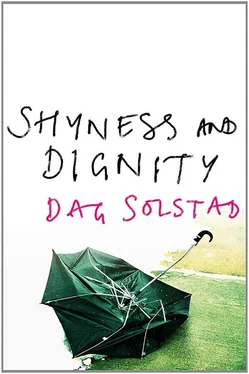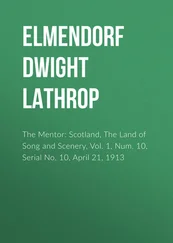This was how he taught the literature of his mother tongue. This was how it went from year to year. For the pupils a steady grind, which in some might arouse a bit of curiosity, if only to understand why a grown-up, well-educated man could have, as his official occupation, the job of sitting behind a desk in a classroom bidding young people to read all these books they were neither particularly interested in nor understood to any great extent, not the way this officially appointed educator tried to make them read them anyway, books that were intended for everybody regardless of whether they were grazed by such a curiosity, which could of course be the first condition for making an effort , so that those who, despite everything, had received their society’s highest general education as nineteen-year-olds would not later in life in their everyday conversation — the sum of which, with its different nuances and under- and overtones, forms society’s own self-understanding — serve up private gush and loose talk about topics worthy of a more seemly demeanour, thereby demonstrating that even among those who had received society’s highest education there were downright uncivilised individuals who did not even have sufficient breeding to hide it, let alone be ashamed of it, he had thought; but this was before the present situation had dawned on him. He had taken his teaching seriously, and often the routine aspect of it had been trying for him, but short of making him feel it was no longer meaningful to teach your mother tongue, and especially its belles-lettres, its beautiful literature, as he jokingly called it at times to his colleagues, and not on account of the few classes in which he seemed to succeed in getting on to something new in the work he was presenting to his pupils, for they were the exceptions, no matter how stimulating, joyful, even brilliant, if he might say so, and they were not a condition for finding his existence to be meaningful. All the more enjoyable it was when such classes occurred. Like now. In this double period on a rainy day in early October, for the graduating seniors. He was on the track of something now. Something having to do with what Ibsen was really struggling with when he wrote The Wild Duck , well, what he was actually looking for. Based on the assumption that Dr Relling is Ibsen’s antagonist and that Dr Relling is right, or ‘right’. No, right. He once more asked the pupils to turn their pages to the end of the play. They did, automatically, grudgingly, without a murmur. He asked one of the pupils to read from where it says, ‘Relling (goes up to Gregers and says): ‘No-one shall ever fool me into thinking …’ The pupil, an overgrown boy dressed in the latest fashion and enveloped in the most profound boredom, read tonelessly and so carelessly that he did not even bother to caricature his own voice to create a bit of ‘life’ or ‘mood’, a little ‘fun and laughter’ in the classroom — not for a moment did he succumb to the temptation to respond to the boredom with a touch of tomfoolery, which would have been natural and often happened in earlier days, he recalled; no, he preferred, as a striking expression of the attitude of his class, to suffer in silence, secure in his conviction, his faith in the future, that it was only a question of time when exhausted and extinct phenomena would no longer form part of the required curriculum for a liberal education, not on this side of the globe at any rate. ‘Relling (goes up to Gregers and says): No-one shall ever fool me into thinking that this was an accident. Gregers (who has stood horror-stricken, twitching convulsively): Nobody can say for certain how this terrible thing happened. Relling: The wadding has burned her bodice. She must have pressed the pistol straight at her breast and fired. Gregers: Hedvig has not died in vain. Didn’t you see how grief released the greatness in him? Relling: Most people show a certain greatness when the stand grieving over a dead body. But how long, do you think, this nobility of his will last? Gregers: Why shouldn’t it last and grow all his life! Relling: Within nine months little Hedvig will be nothing more to him than a fine pretext for speechifying. Gregers: You dare say that about Hjalmar Ekdal! Relling: We’ll talk again when the first grass has withered on her grave. Then you will hear him spouting phrases like ‘the child prematurely torn from the paternal bosom’, then you can watch him wallowing in sentiment, self-admiration and self-pity. Wait and see! Gregers: If you are right and I am wrong, life is not worth living.’ Thanks, he said, and the pupil instantly stopped his toneless reading. That’s it, he burst out. What we’ve been looking for. Don’t you see, Dr Relling is right, you can see that! Of course, Dr Relling is right, we could all of us have said the same thing, it’s to the point. And yet, the drama is that of Gregers Werle. It’s what he says that makes the play tick, he said, for some reason or other, he had perhaps meant to say kick or stick. He grew slightly embarrassed at this ‘tick’, which had fallen out of his mouth. Yes, ‘tick,’ he repeated, for what does Gregers Werle say? Well, he says, If Dr Relling is right, what we are doing here is not worthwhile, and Dr Relling is right, after all, but so what? Well, what he says, damn it, he exclaimed. What Gregers Werle says is the drama, after all! What has Gregers Werle not done? He has killed Hedvig, lured her, seduced her with words, to carry out this sacrifice. Hedvig, this half-blind child, in puberty, with a pistol in her hand inside an absurd dark attic to make a sacrifice, suddenly understands that it is not the wild duck, but herself she must give to her father, about whom she too has her doubts, being uncertain whether he is her father or not, but she is his daughter unto death all the same, about that she has no doubts, so why the wild duck when she has herself, unto death herself, to give away? And then she does it! The shot is fired. Now he certainly must understand that he is her father and that she loves him. What cruelty is hidden in the depths of this play, he exclaimed. An elder brother driving his little sister to her death, and afterwards he needs to see the imagined father experience a sincere sorrow, for otherwise life is not worth living. Gregers Werle is shuddering, both at his own deed and at the possibility that Dr Relling is right. And Dr Relling is right, but it is Gregers Werle’s shudders which are … which are … He searched desperately for words. He was on the track now, but he could not find the right word for it. He had it on the tip of his tongue, but did not find it. He was in despair, but not because, as a teacher, he was unable to give so brilliant an interpretation of The Wild Duck as he thought he could see in his mind’s eye. That, he felt, was fully compensated for by the fact that the pupils had now had the rare opportunity, he would not hesitate to say good fortune, of observing, in close-up, a grown man struggle with the absolutely essential questions of our cultural legacy in an acceptable, though imperfect, way, making him stammer, perspire, follow certain trains of thought as far as he, in his incomplete manner, was capable of doing, and if that was not sufficient to cause the nostrils of at least some of his pupils to start sensing some of the conditions which their lives, too, would build on, as a foundation, and even if they might never read this play by Henrik Ibsen again, they would still understand the reasons why this play was present here, now. No, his despair was due solely to his not finding the words he was searching for, which he thought were so near, but when he wanted to get at them, and pronounce them, they were not there, except for a rather useless, miserable surrogate, which might be somewhat similar, as far as it went, but not at all what he had been looking for and even thought he had found. Terrible, he burst out, we will have to do it once more.
Читать дальше










